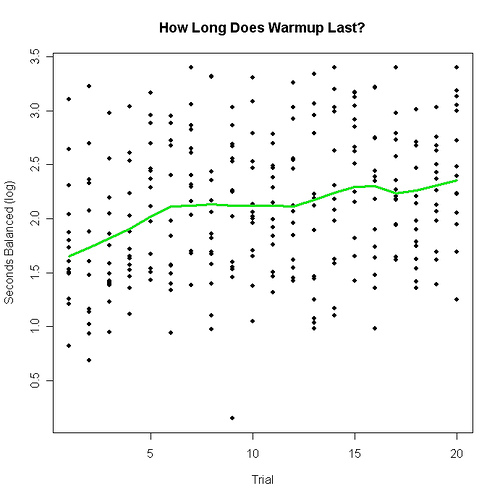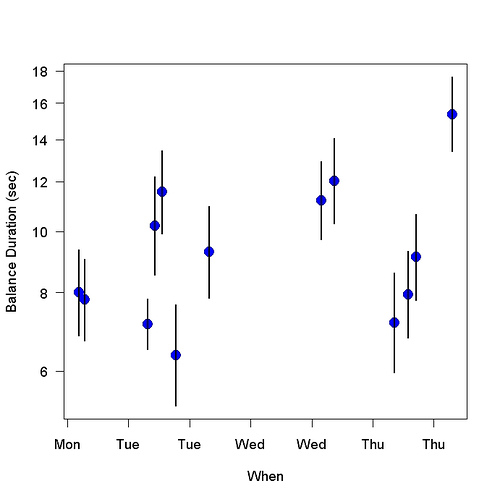Thanks a lot to those who commented on my previous post, very helpful comments. Barleyblair said that after greatly increasing her omega-3 intake she too found her balance greatly improved — not only could she put her socks on while standing she could put her shoes on while standing, which she hadn’t even dreamed of being able to do. Bekel said her sleep is deep and restful because of flaxseed oil. Pauls referred me to a Real-Age test of balance where you stand on one foot with your eyes closed. I tried it. It was way too easy: After two minute I opened my eyes and stopped the test. The table that tells you what the results means only goes up to 28 seconds. If the table is not completely bogus, then my balance is much better than average. Which is consistent with my working hypotheses that (a) the average American gets far too little omega-3 and (b) my brain function — indexed by my ability to balance — greatly improved when I increased my omega-3 intake. Keep in mind that according to conventional recommendations I ate plenty of fish (several servings per week) before increasing my omega-3 intake.
Before doing a simple test of the effects of omega-3 on my balance, I would like to establish a steady baseline and get an idea of what normal variation is. If possible, I would like to reduce normal variation — reduce background noise, in other words. With this goal I have measured my balance 13 times under roughly the same conditions: barefoot, listening to a book (a fascinating book, by the way: Cod: A Biography of the Fish that Changed the World by Mark Kurlansky) while doing the test, 20 trials per test. Each trial consists of standing on one foot on the cutting board on the 0.5-inch platform (see equipment here) and measuring how long until my other foot touches the ground. Each test takes about 10 minutes. I like the book so I enjoy the tests.
Below are the results from all 13 tests as a function of trial number. They show that there is a warmup period lasting 5 trials.

That just refines warmup measurements I posted previously. This is completely new:

The x axis shows when the test was done; points that are close together on the x axis were done close together in time — e.g., an hour apart. I hoped for a steady baseline so that I could go on to more interesting stuff. That is not what I found. I did a one-factor F test to see if there was significant heterogeniety. I used only the last 15 trials of each test, dropping the first 5 “warmup” trials. There were 13 levels (the 13 tests) of one factor. There was a highly reliable (p = .003) effect of test, meaning the variation from one test to the next was too large to be sampling error. And this test did not take into account the obvious clustering — tests close in time had similar results. The clustering makes it even more likely there were real differences in balancing ability from one test (or rather cluster of tests) to the next.
Apparently my balancing ability can change substantially in several hours! (For example, the time between the last test and the next-to-last test, the last in a cluster of three, was 7 hours.) And my test is sensitive enough to detect this! Forgive the exclamation marks. Nothing in my knowledge of psychology makes it obvious or even likely that this would be true — that a measure of quality of brain function would vary so much in hours that it could be detected by single measurements. Or that single measurements would be precise enough to detect such a change. Of course brain function (e.g., alertness) may get worse as you get sleepy but in this case my balance was much better in the evening than in the morning. The differences in my scores had no correlate that I could notice — I didn’t feel noticeably different when I did worse than when I did better.
What might be causing the differences? Body temperature or other circadian rhythm: Unlikely, because one would expect best performance when body temperature is highest, around 4 pm, which does not fit the results very well. More plausible: blood concentration of omega-3. It will be relatively low in the morning because while I was asleep I took no flaxseed oil or walnut oil. It will rise during the day as I consume these. This is consistent with the high measurements in the early evening.
Whatever the cause, these data suggest that something in ordinary life (which includes omega-3 consumption) can improve brain function within hours. If you, dear reader, know of other data that suggests this conclusion please let me know. Drugs and alcohol can quickly change brain function but they are not involved here. Nor am I listening to music, also believed to improve brain function (slightly). I am going to try to reduce fluctuations in omega-3 blood levels and see if I get more uniform measurements. I had a cup of tea with caffeine this afternoon; caffeine consumption is something else I will better control (by eliminating it).
That was interesting. I’ve not done a balance test with my eyes closed. But it was fun how quickly I learned it well enough to get past the end of the test.
Thanks, that was fun.